A Report on Employment Law under UK Legislation
VerifiedAdded on 2023/06/10
|15
|3936
|91
AI Summary
This report investigates the appropriate application of Employment Laws and Legal Proceedings in the organisational framework of Carling UK Ltd. It analyses critical employment issues and evaluates the competence of the HR Managers. The report concludes with recommendations to improve organisational culture and keep market goodwill intact.
Contribute Materials
Your contribution can guide someone’s learning journey. Share your
documents today.
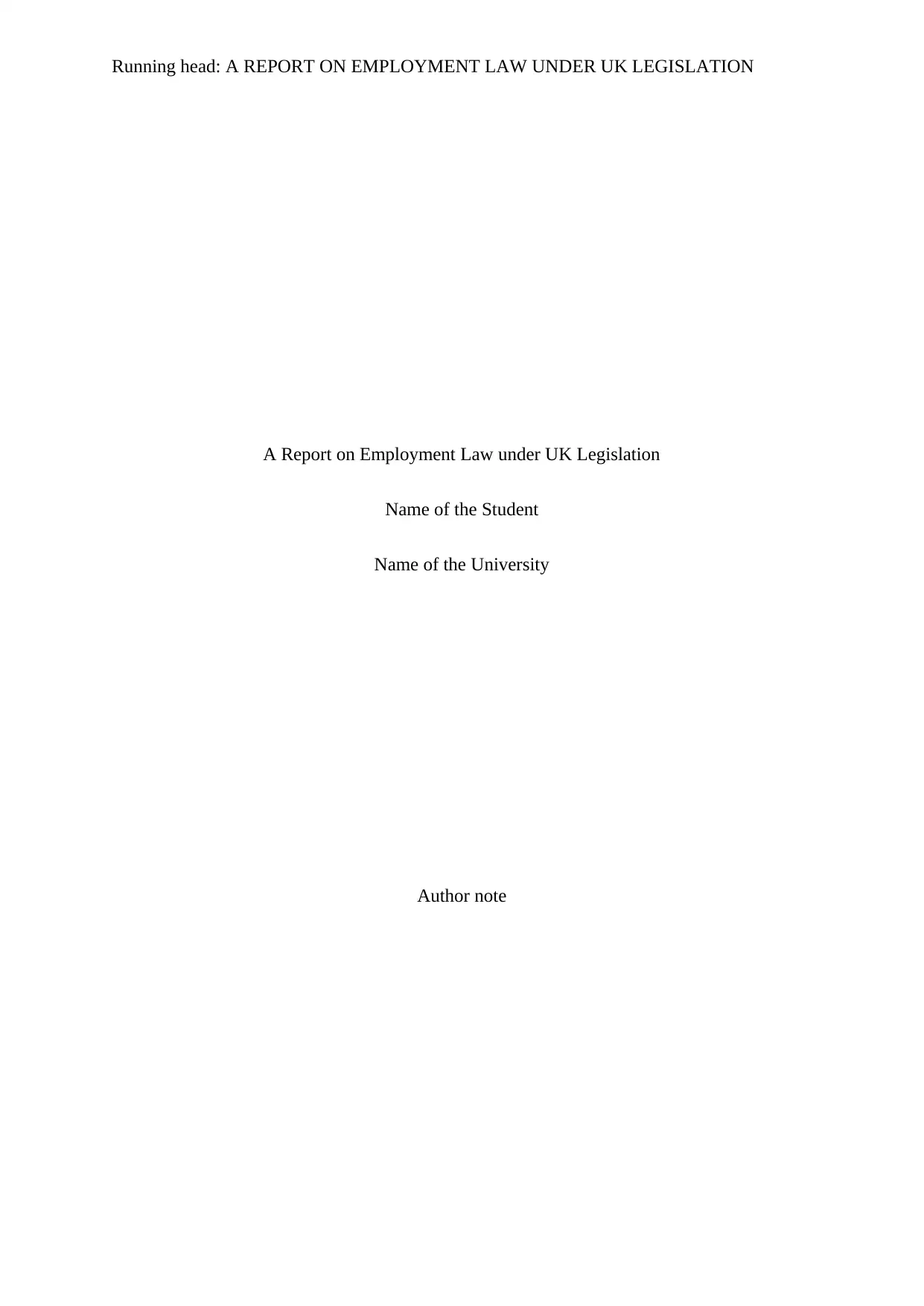
Running head: A REPORT ON EMPLOYMENT LAW UNDER UK LEGISLATION
A Report on Employment Law under UK Legislation
Name of the Student
Name of the University
Author note
A Report on Employment Law under UK Legislation
Name of the Student
Name of the University
Author note
Secure Best Marks with AI Grader
Need help grading? Try our AI Grader for instant feedback on your assignments.
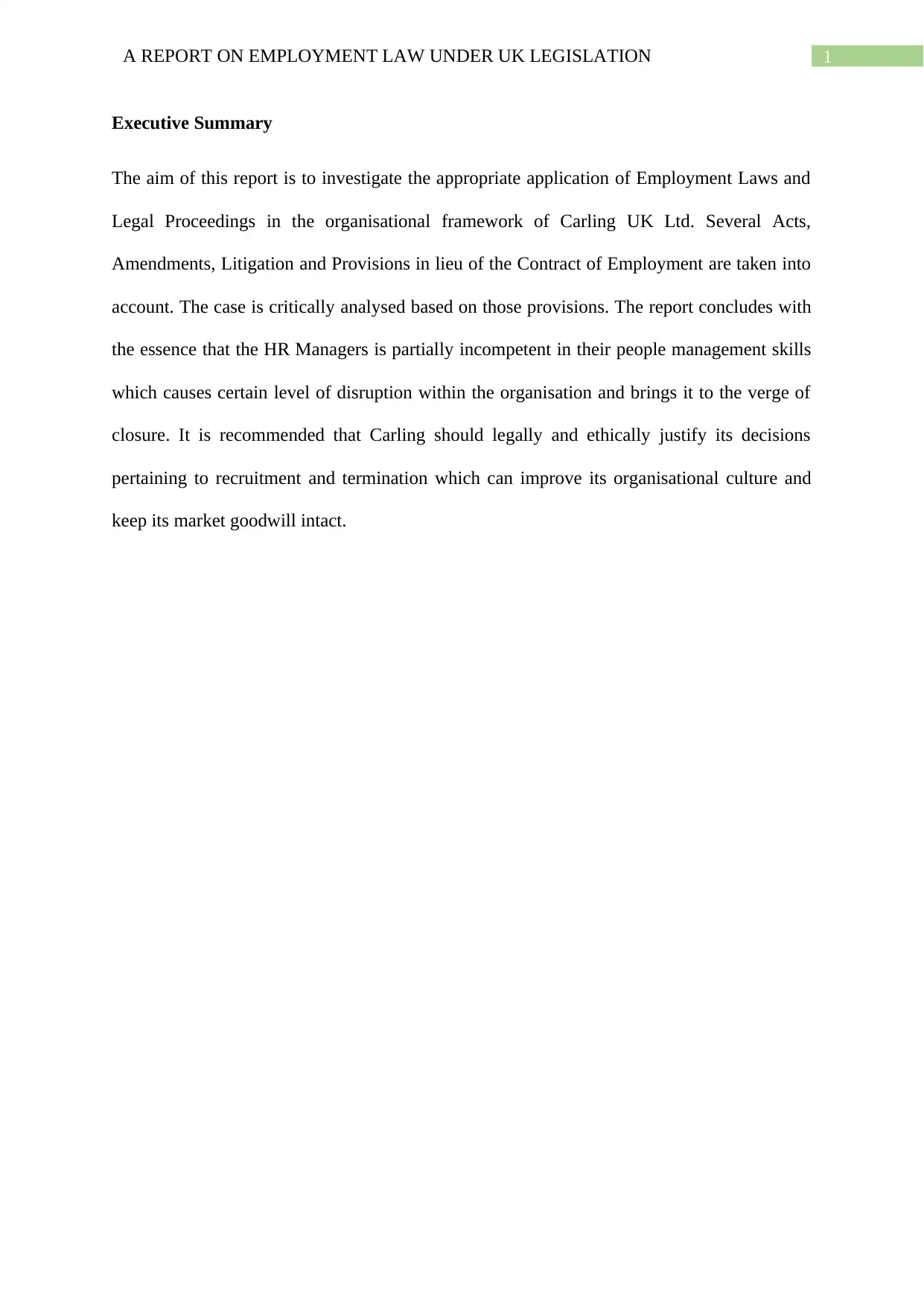
1A REPORT ON EMPLOYMENT LAW UNDER UK LEGISLATION
Executive Summary
The aim of this report is to investigate the appropriate application of Employment Laws and
Legal Proceedings in the organisational framework of Carling UK Ltd. Several Acts,
Amendments, Litigation and Provisions in lieu of the Contract of Employment are taken into
account. The case is critically analysed based on those provisions. The report concludes with
the essence that the HR Managers is partially incompetent in their people management skills
which causes certain level of disruption within the organisation and brings it to the verge of
closure. It is recommended that Carling should legally and ethically justify its decisions
pertaining to recruitment and termination which can improve its organisational culture and
keep its market goodwill intact.
Executive Summary
The aim of this report is to investigate the appropriate application of Employment Laws and
Legal Proceedings in the organisational framework of Carling UK Ltd. Several Acts,
Amendments, Litigation and Provisions in lieu of the Contract of Employment are taken into
account. The case is critically analysed based on those provisions. The report concludes with
the essence that the HR Managers is partially incompetent in their people management skills
which causes certain level of disruption within the organisation and brings it to the verge of
closure. It is recommended that Carling should legally and ethically justify its decisions
pertaining to recruitment and termination which can improve its organisational culture and
keep its market goodwill intact.
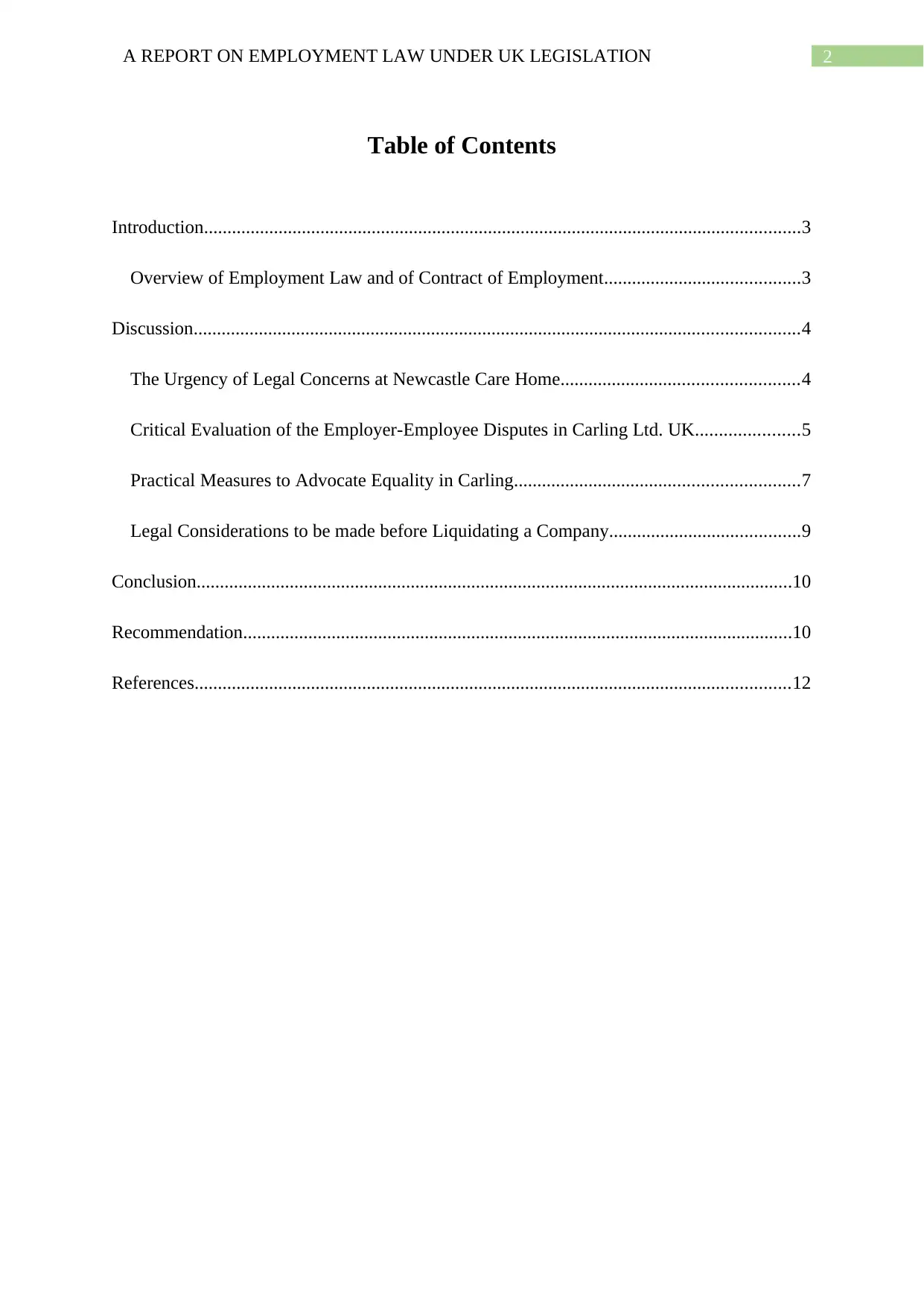
2A REPORT ON EMPLOYMENT LAW UNDER UK LEGISLATION
Table of Contents
Introduction................................................................................................................................3
Overview of Employment Law and of Contract of Employment..........................................3
Discussion..................................................................................................................................4
The Urgency of Legal Concerns at Newcastle Care Home...................................................4
Critical Evaluation of the Employer-Employee Disputes in Carling Ltd. UK......................5
Practical Measures to Advocate Equality in Carling.............................................................7
Legal Considerations to be made before Liquidating a Company.........................................9
Conclusion................................................................................................................................10
Recommendation......................................................................................................................10
References................................................................................................................................12
Table of Contents
Introduction................................................................................................................................3
Overview of Employment Law and of Contract of Employment..........................................3
Discussion..................................................................................................................................4
The Urgency of Legal Concerns at Newcastle Care Home...................................................4
Critical Evaluation of the Employer-Employee Disputes in Carling Ltd. UK......................5
Practical Measures to Advocate Equality in Carling.............................................................7
Legal Considerations to be made before Liquidating a Company.........................................9
Conclusion................................................................................................................................10
Recommendation......................................................................................................................10
References................................................................................................................................12
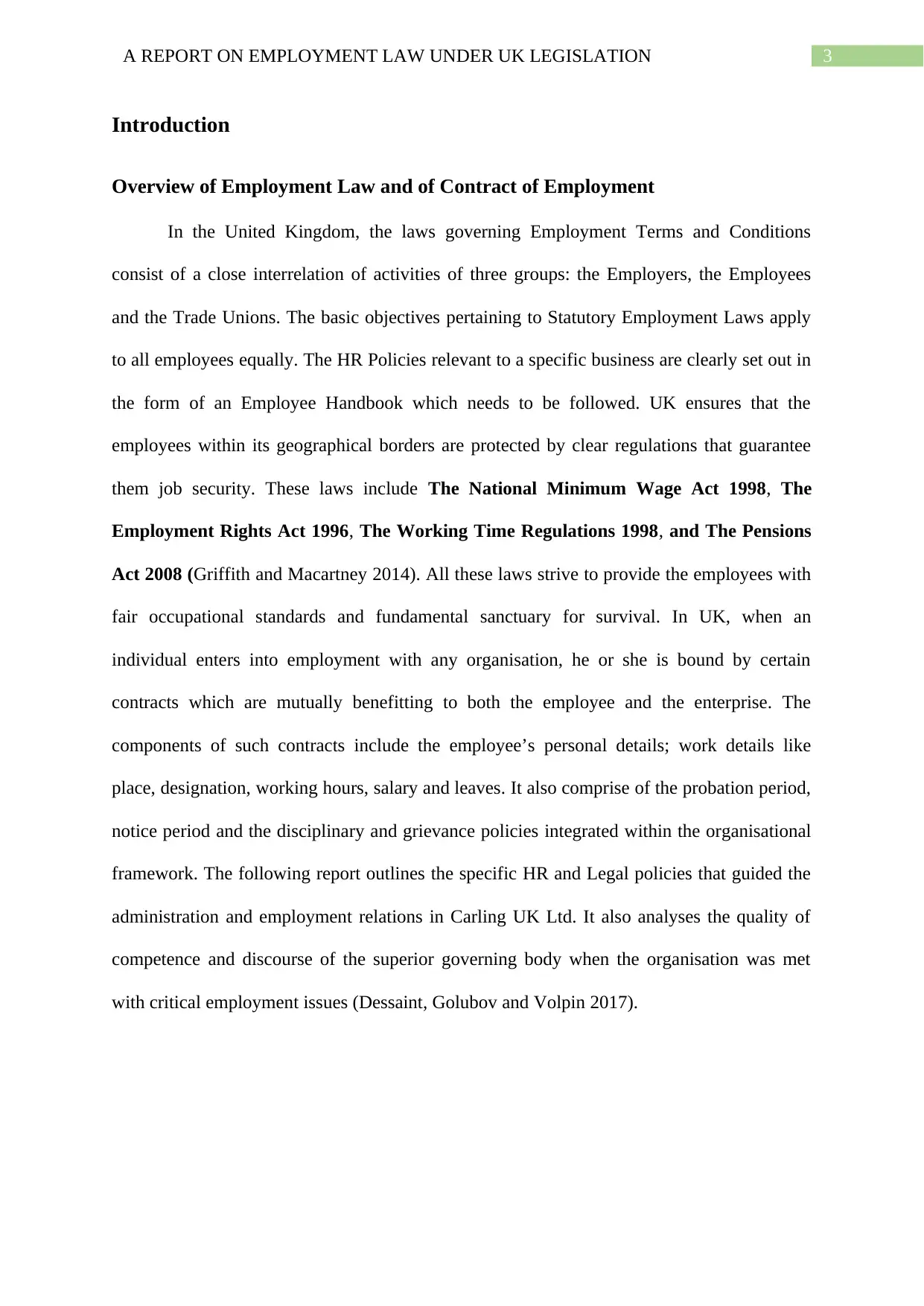
3A REPORT ON EMPLOYMENT LAW UNDER UK LEGISLATION
Introduction
Overview of Employment Law and of Contract of Employment
In the United Kingdom, the laws governing Employment Terms and Conditions
consist of a close interrelation of activities of three groups: the Employers, the Employees
and the Trade Unions. The basic objectives pertaining to Statutory Employment Laws apply
to all employees equally. The HR Policies relevant to a specific business are clearly set out in
the form of an Employee Handbook which needs to be followed. UK ensures that the
employees within its geographical borders are protected by clear regulations that guarantee
them job security. These laws include The National Minimum Wage Act 1998, The
Employment Rights Act 1996, The Working Time Regulations 1998, and The Pensions
Act 2008 (Griffith and Macartney 2014). All these laws strive to provide the employees with
fair occupational standards and fundamental sanctuary for survival. In UK, when an
individual enters into employment with any organisation, he or she is bound by certain
contracts which are mutually benefitting to both the employee and the enterprise. The
components of such contracts include the employee’s personal details; work details like
place, designation, working hours, salary and leaves. It also comprise of the probation period,
notice period and the disciplinary and grievance policies integrated within the organisational
framework. The following report outlines the specific HR and Legal policies that guided the
administration and employment relations in Carling UK Ltd. It also analyses the quality of
competence and discourse of the superior governing body when the organisation was met
with critical employment issues (Dessaint, Golubov and Volpin 2017).
Introduction
Overview of Employment Law and of Contract of Employment
In the United Kingdom, the laws governing Employment Terms and Conditions
consist of a close interrelation of activities of three groups: the Employers, the Employees
and the Trade Unions. The basic objectives pertaining to Statutory Employment Laws apply
to all employees equally. The HR Policies relevant to a specific business are clearly set out in
the form of an Employee Handbook which needs to be followed. UK ensures that the
employees within its geographical borders are protected by clear regulations that guarantee
them job security. These laws include The National Minimum Wage Act 1998, The
Employment Rights Act 1996, The Working Time Regulations 1998, and The Pensions
Act 2008 (Griffith and Macartney 2014). All these laws strive to provide the employees with
fair occupational standards and fundamental sanctuary for survival. In UK, when an
individual enters into employment with any organisation, he or she is bound by certain
contracts which are mutually benefitting to both the employee and the enterprise. The
components of such contracts include the employee’s personal details; work details like
place, designation, working hours, salary and leaves. It also comprise of the probation period,
notice period and the disciplinary and grievance policies integrated within the organisational
framework. The following report outlines the specific HR and Legal policies that guided the
administration and employment relations in Carling UK Ltd. It also analyses the quality of
competence and discourse of the superior governing body when the organisation was met
with critical employment issues (Dessaint, Golubov and Volpin 2017).
Secure Best Marks with AI Grader
Need help grading? Try our AI Grader for instant feedback on your assignments.
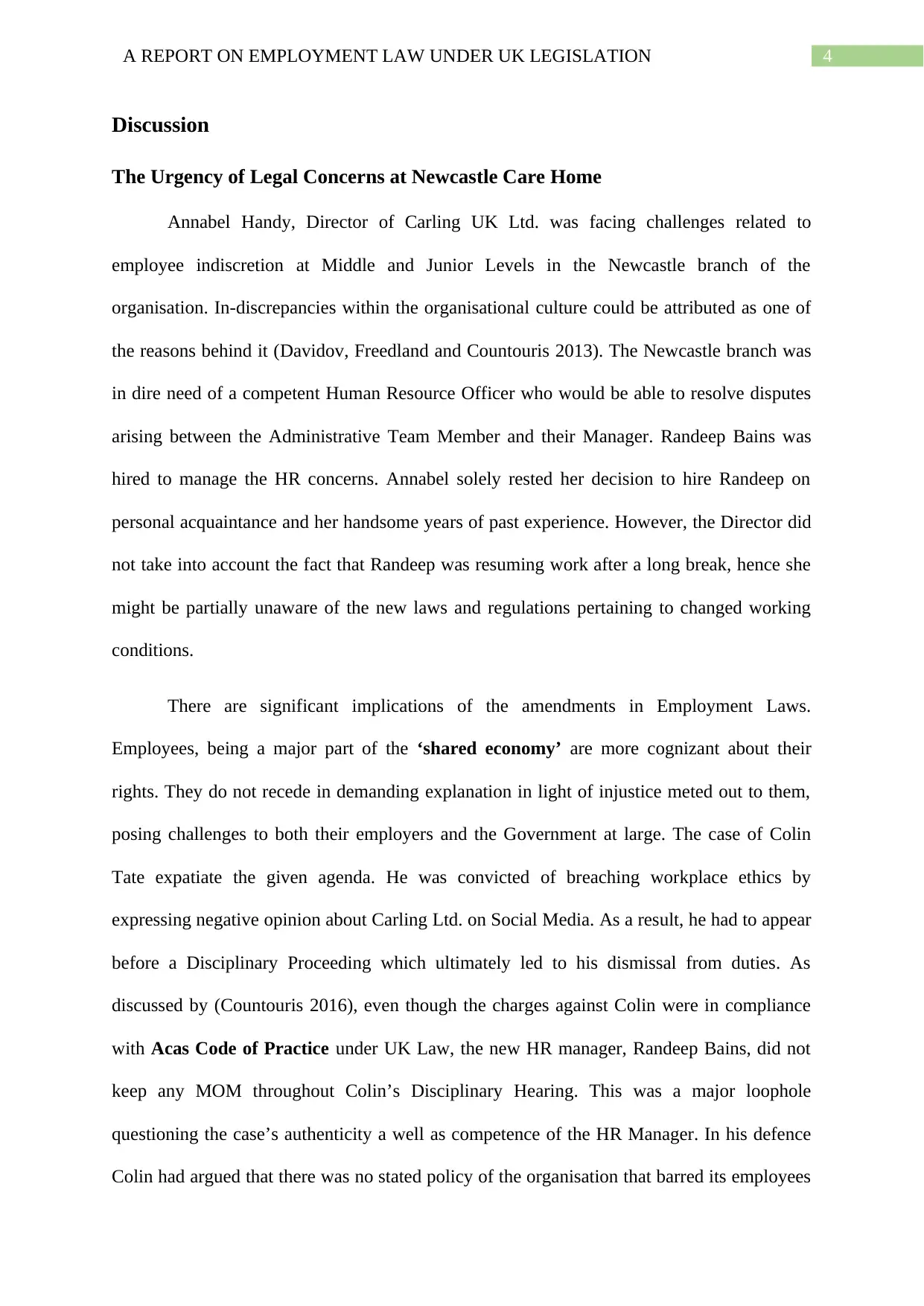
4A REPORT ON EMPLOYMENT LAW UNDER UK LEGISLATION
Discussion
The Urgency of Legal Concerns at Newcastle Care Home
Annabel Handy, Director of Carling UK Ltd. was facing challenges related to
employee indiscretion at Middle and Junior Levels in the Newcastle branch of the
organisation. In-discrepancies within the organisational culture could be attributed as one of
the reasons behind it (Davidov, Freedland and Countouris 2013). The Newcastle branch was
in dire need of a competent Human Resource Officer who would be able to resolve disputes
arising between the Administrative Team Member and their Manager. Randeep Bains was
hired to manage the HR concerns. Annabel solely rested her decision to hire Randeep on
personal acquaintance and her handsome years of past experience. However, the Director did
not take into account the fact that Randeep was resuming work after a long break, hence she
might be partially unaware of the new laws and regulations pertaining to changed working
conditions.
There are significant implications of the amendments in Employment Laws.
Employees, being a major part of the ‘shared economy’ are more cognizant about their
rights. They do not recede in demanding explanation in light of injustice meted out to them,
posing challenges to both their employers and the Government at large. The case of Colin
Tate expatiate the given agenda. He was convicted of breaching workplace ethics by
expressing negative opinion about Carling Ltd. on Social Media. As a result, he had to appear
before a Disciplinary Proceeding which ultimately led to his dismissal from duties. As
discussed by (Countouris 2016), even though the charges against Colin were in compliance
with Acas Code of Practice under UK Law, the new HR manager, Randeep Bains, did not
keep any MOM throughout Colin’s Disciplinary Hearing. This was a major loophole
questioning the case’s authenticity a well as competence of the HR Manager. In his defence
Colin had argued that there was no stated policy of the organisation that barred its employees
Discussion
The Urgency of Legal Concerns at Newcastle Care Home
Annabel Handy, Director of Carling UK Ltd. was facing challenges related to
employee indiscretion at Middle and Junior Levels in the Newcastle branch of the
organisation. In-discrepancies within the organisational culture could be attributed as one of
the reasons behind it (Davidov, Freedland and Countouris 2013). The Newcastle branch was
in dire need of a competent Human Resource Officer who would be able to resolve disputes
arising between the Administrative Team Member and their Manager. Randeep Bains was
hired to manage the HR concerns. Annabel solely rested her decision to hire Randeep on
personal acquaintance and her handsome years of past experience. However, the Director did
not take into account the fact that Randeep was resuming work after a long break, hence she
might be partially unaware of the new laws and regulations pertaining to changed working
conditions.
There are significant implications of the amendments in Employment Laws.
Employees, being a major part of the ‘shared economy’ are more cognizant about their
rights. They do not recede in demanding explanation in light of injustice meted out to them,
posing challenges to both their employers and the Government at large. The case of Colin
Tate expatiate the given agenda. He was convicted of breaching workplace ethics by
expressing negative opinion about Carling Ltd. on Social Media. As a result, he had to appear
before a Disciplinary Proceeding which ultimately led to his dismissal from duties. As
discussed by (Countouris 2016), even though the charges against Colin were in compliance
with Acas Code of Practice under UK Law, the new HR manager, Randeep Bains, did not
keep any MOM throughout Colin’s Disciplinary Hearing. This was a major loophole
questioning the case’s authenticity a well as competence of the HR Manager. In his defence
Colin had argued that there was no stated policy of the organisation that barred its employees
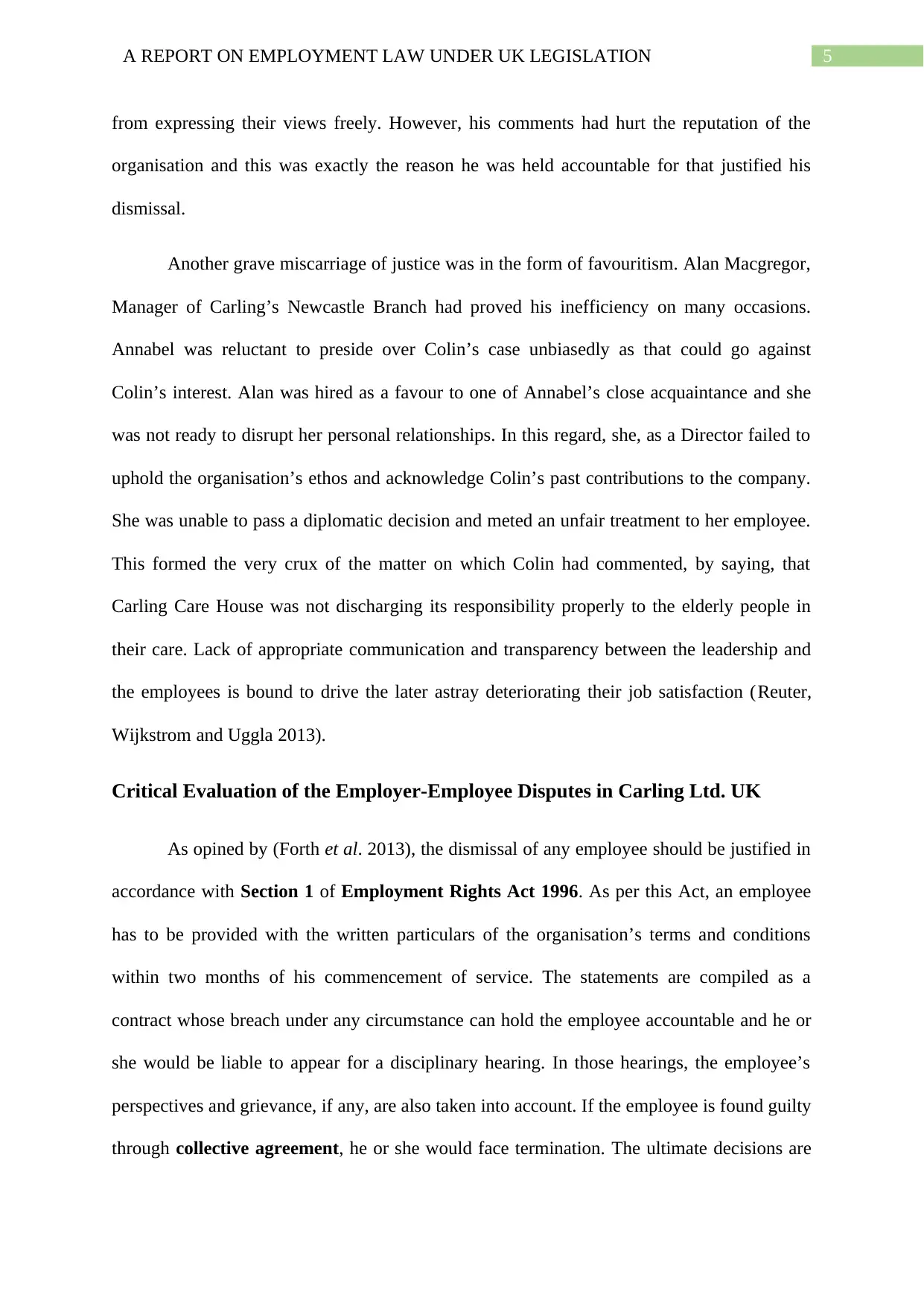
5A REPORT ON EMPLOYMENT LAW UNDER UK LEGISLATION
from expressing their views freely. However, his comments had hurt the reputation of the
organisation and this was exactly the reason he was held accountable for that justified his
dismissal.
Another grave miscarriage of justice was in the form of favouritism. Alan Macgregor,
Manager of Carling’s Newcastle Branch had proved his inefficiency on many occasions.
Annabel was reluctant to preside over Colin’s case unbiasedly as that could go against
Colin’s interest. Alan was hired as a favour to one of Annabel’s close acquaintance and she
was not ready to disrupt her personal relationships. In this regard, she, as a Director failed to
uphold the organisation’s ethos and acknowledge Colin’s past contributions to the company.
She was unable to pass a diplomatic decision and meted an unfair treatment to her employee.
This formed the very crux of the matter on which Colin had commented, by saying, that
Carling Care House was not discharging its responsibility properly to the elderly people in
their care. Lack of appropriate communication and transparency between the leadership and
the employees is bound to drive the later astray deteriorating their job satisfaction (Reuter,
Wijkstrom and Uggla 2013).
Critical Evaluation of the Employer-Employee Disputes in Carling Ltd. UK
As opined by (Forth et al. 2013), the dismissal of any employee should be justified in
accordance with Section 1 of Employment Rights Act 1996. As per this Act, an employee
has to be provided with the written particulars of the organisation’s terms and conditions
within two months of his commencement of service. The statements are compiled as a
contract whose breach under any circumstance can hold the employee accountable and he or
she would be liable to appear for a disciplinary hearing. In those hearings, the employee’s
perspectives and grievance, if any, are also taken into account. If the employee is found guilty
through collective agreement, he or she would face termination. The ultimate decisions are
from expressing their views freely. However, his comments had hurt the reputation of the
organisation and this was exactly the reason he was held accountable for that justified his
dismissal.
Another grave miscarriage of justice was in the form of favouritism. Alan Macgregor,
Manager of Carling’s Newcastle Branch had proved his inefficiency on many occasions.
Annabel was reluctant to preside over Colin’s case unbiasedly as that could go against
Colin’s interest. Alan was hired as a favour to one of Annabel’s close acquaintance and she
was not ready to disrupt her personal relationships. In this regard, she, as a Director failed to
uphold the organisation’s ethos and acknowledge Colin’s past contributions to the company.
She was unable to pass a diplomatic decision and meted an unfair treatment to her employee.
This formed the very crux of the matter on which Colin had commented, by saying, that
Carling Care House was not discharging its responsibility properly to the elderly people in
their care. Lack of appropriate communication and transparency between the leadership and
the employees is bound to drive the later astray deteriorating their job satisfaction (Reuter,
Wijkstrom and Uggla 2013).
Critical Evaluation of the Employer-Employee Disputes in Carling Ltd. UK
As opined by (Forth et al. 2013), the dismissal of any employee should be justified in
accordance with Section 1 of Employment Rights Act 1996. As per this Act, an employee
has to be provided with the written particulars of the organisation’s terms and conditions
within two months of his commencement of service. The statements are compiled as a
contract whose breach under any circumstance can hold the employee accountable and he or
she would be liable to appear for a disciplinary hearing. In those hearings, the employee’s
perspectives and grievance, if any, are also taken into account. If the employee is found guilty
through collective agreement, he or she would face termination. The ultimate decisions are
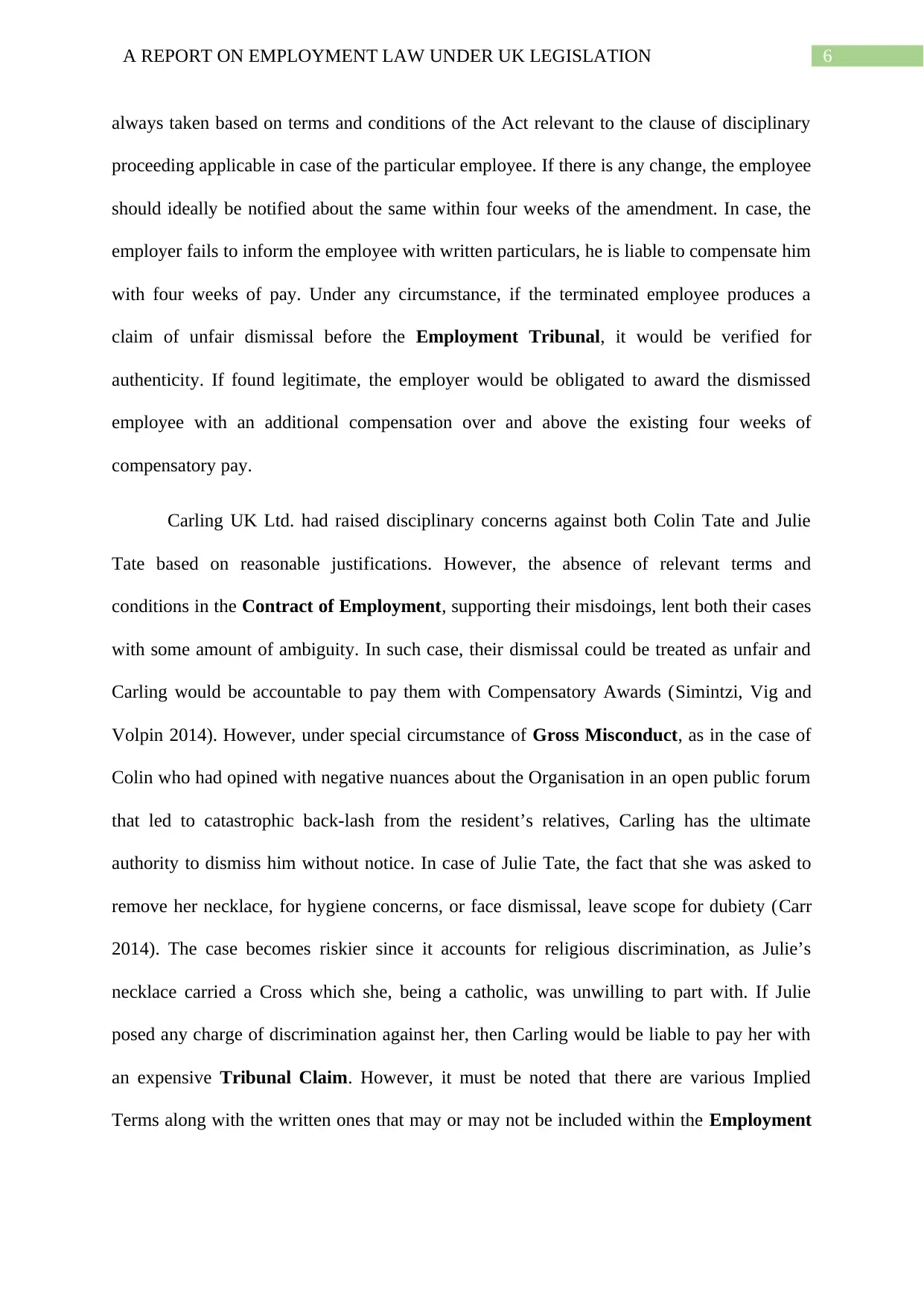
6A REPORT ON EMPLOYMENT LAW UNDER UK LEGISLATION
always taken based on terms and conditions of the Act relevant to the clause of disciplinary
proceeding applicable in case of the particular employee. If there is any change, the employee
should ideally be notified about the same within four weeks of the amendment. In case, the
employer fails to inform the employee with written particulars, he is liable to compensate him
with four weeks of pay. Under any circumstance, if the terminated employee produces a
claim of unfair dismissal before the Employment Tribunal, it would be verified for
authenticity. If found legitimate, the employer would be obligated to award the dismissed
employee with an additional compensation over and above the existing four weeks of
compensatory pay.
Carling UK Ltd. had raised disciplinary concerns against both Colin Tate and Julie
Tate based on reasonable justifications. However, the absence of relevant terms and
conditions in the Contract of Employment, supporting their misdoings, lent both their cases
with some amount of ambiguity. In such case, their dismissal could be treated as unfair and
Carling would be accountable to pay them with Compensatory Awards (Simintzi, Vig and
Volpin 2014). However, under special circumstance of Gross Misconduct, as in the case of
Colin who had opined with negative nuances about the Organisation in an open public forum
that led to catastrophic back-lash from the resident’s relatives, Carling has the ultimate
authority to dismiss him without notice. In case of Julie Tate, the fact that she was asked to
remove her necklace, for hygiene concerns, or face dismissal, leave scope for dubiety (Carr
2014). The case becomes riskier since it accounts for religious discrimination, as Julie’s
necklace carried a Cross which she, being a catholic, was unwilling to part with. If Julie
posed any charge of discrimination against her, then Carling would be liable to pay her with
an expensive Tribunal Claim. However, it must be noted that there are various Implied
Terms along with the written ones that may or may not be included within the Employment
always taken based on terms and conditions of the Act relevant to the clause of disciplinary
proceeding applicable in case of the particular employee. If there is any change, the employee
should ideally be notified about the same within four weeks of the amendment. In case, the
employer fails to inform the employee with written particulars, he is liable to compensate him
with four weeks of pay. Under any circumstance, if the terminated employee produces a
claim of unfair dismissal before the Employment Tribunal, it would be verified for
authenticity. If found legitimate, the employer would be obligated to award the dismissed
employee with an additional compensation over and above the existing four weeks of
compensatory pay.
Carling UK Ltd. had raised disciplinary concerns against both Colin Tate and Julie
Tate based on reasonable justifications. However, the absence of relevant terms and
conditions in the Contract of Employment, supporting their misdoings, lent both their cases
with some amount of ambiguity. In such case, their dismissal could be treated as unfair and
Carling would be accountable to pay them with Compensatory Awards (Simintzi, Vig and
Volpin 2014). However, under special circumstance of Gross Misconduct, as in the case of
Colin who had opined with negative nuances about the Organisation in an open public forum
that led to catastrophic back-lash from the resident’s relatives, Carling has the ultimate
authority to dismiss him without notice. In case of Julie Tate, the fact that she was asked to
remove her necklace, for hygiene concerns, or face dismissal, leave scope for dubiety (Carr
2014). The case becomes riskier since it accounts for religious discrimination, as Julie’s
necklace carried a Cross which she, being a catholic, was unwilling to part with. If Julie
posed any charge of discrimination against her, then Carling would be liable to pay her with
an expensive Tribunal Claim. However, it must be noted that there are various Implied
Terms along with the written ones that may or may not be included within the Employment
Paraphrase This Document
Need a fresh take? Get an instant paraphrase of this document with our AI Paraphraser
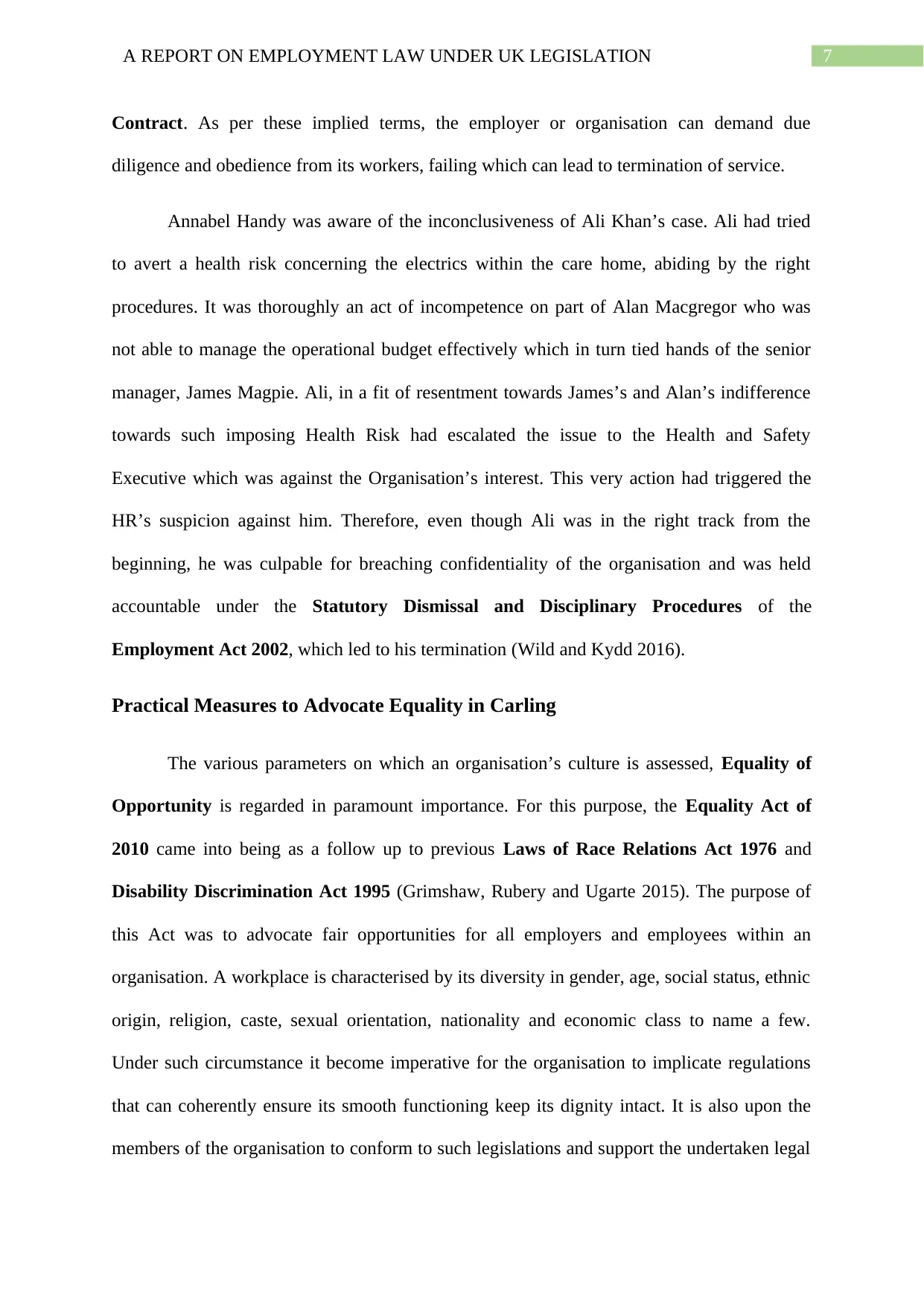
7A REPORT ON EMPLOYMENT LAW UNDER UK LEGISLATION
Contract. As per these implied terms, the employer or organisation can demand due
diligence and obedience from its workers, failing which can lead to termination of service.
Annabel Handy was aware of the inconclusiveness of Ali Khan’s case. Ali had tried
to avert a health risk concerning the electrics within the care home, abiding by the right
procedures. It was thoroughly an act of incompetence on part of Alan Macgregor who was
not able to manage the operational budget effectively which in turn tied hands of the senior
manager, James Magpie. Ali, in a fit of resentment towards James’s and Alan’s indifference
towards such imposing Health Risk had escalated the issue to the Health and Safety
Executive which was against the Organisation’s interest. This very action had triggered the
HR’s suspicion against him. Therefore, even though Ali was in the right track from the
beginning, he was culpable for breaching confidentiality of the organisation and was held
accountable under the Statutory Dismissal and Disciplinary Procedures of the
Employment Act 2002, which led to his termination (Wild and Kydd 2016).
Practical Measures to Advocate Equality in Carling
The various parameters on which an organisation’s culture is assessed, Equality of
Opportunity is regarded in paramount importance. For this purpose, the Equality Act of
2010 came into being as a follow up to previous Laws of Race Relations Act 1976 and
Disability Discrimination Act 1995 (Grimshaw, Rubery and Ugarte 2015). The purpose of
this Act was to advocate fair opportunities for all employers and employees within an
organisation. A workplace is characterised by its diversity in gender, age, social status, ethnic
origin, religion, caste, sexual orientation, nationality and economic class to name a few.
Under such circumstance it become imperative for the organisation to implicate regulations
that can coherently ensure its smooth functioning keep its dignity intact. It is also upon the
members of the organisation to conform to such legislations and support the undertaken legal
Contract. As per these implied terms, the employer or organisation can demand due
diligence and obedience from its workers, failing which can lead to termination of service.
Annabel Handy was aware of the inconclusiveness of Ali Khan’s case. Ali had tried
to avert a health risk concerning the electrics within the care home, abiding by the right
procedures. It was thoroughly an act of incompetence on part of Alan Macgregor who was
not able to manage the operational budget effectively which in turn tied hands of the senior
manager, James Magpie. Ali, in a fit of resentment towards James’s and Alan’s indifference
towards such imposing Health Risk had escalated the issue to the Health and Safety
Executive which was against the Organisation’s interest. This very action had triggered the
HR’s suspicion against him. Therefore, even though Ali was in the right track from the
beginning, he was culpable for breaching confidentiality of the organisation and was held
accountable under the Statutory Dismissal and Disciplinary Procedures of the
Employment Act 2002, which led to his termination (Wild and Kydd 2016).
Practical Measures to Advocate Equality in Carling
The various parameters on which an organisation’s culture is assessed, Equality of
Opportunity is regarded in paramount importance. For this purpose, the Equality Act of
2010 came into being as a follow up to previous Laws of Race Relations Act 1976 and
Disability Discrimination Act 1995 (Grimshaw, Rubery and Ugarte 2015). The purpose of
this Act was to advocate fair opportunities for all employers and employees within an
organisation. A workplace is characterised by its diversity in gender, age, social status, ethnic
origin, religion, caste, sexual orientation, nationality and economic class to name a few.
Under such circumstance it become imperative for the organisation to implicate regulations
that can coherently ensure its smooth functioning keep its dignity intact. It is also upon the
members of the organisation to conform to such legislations and support the undertaken legal
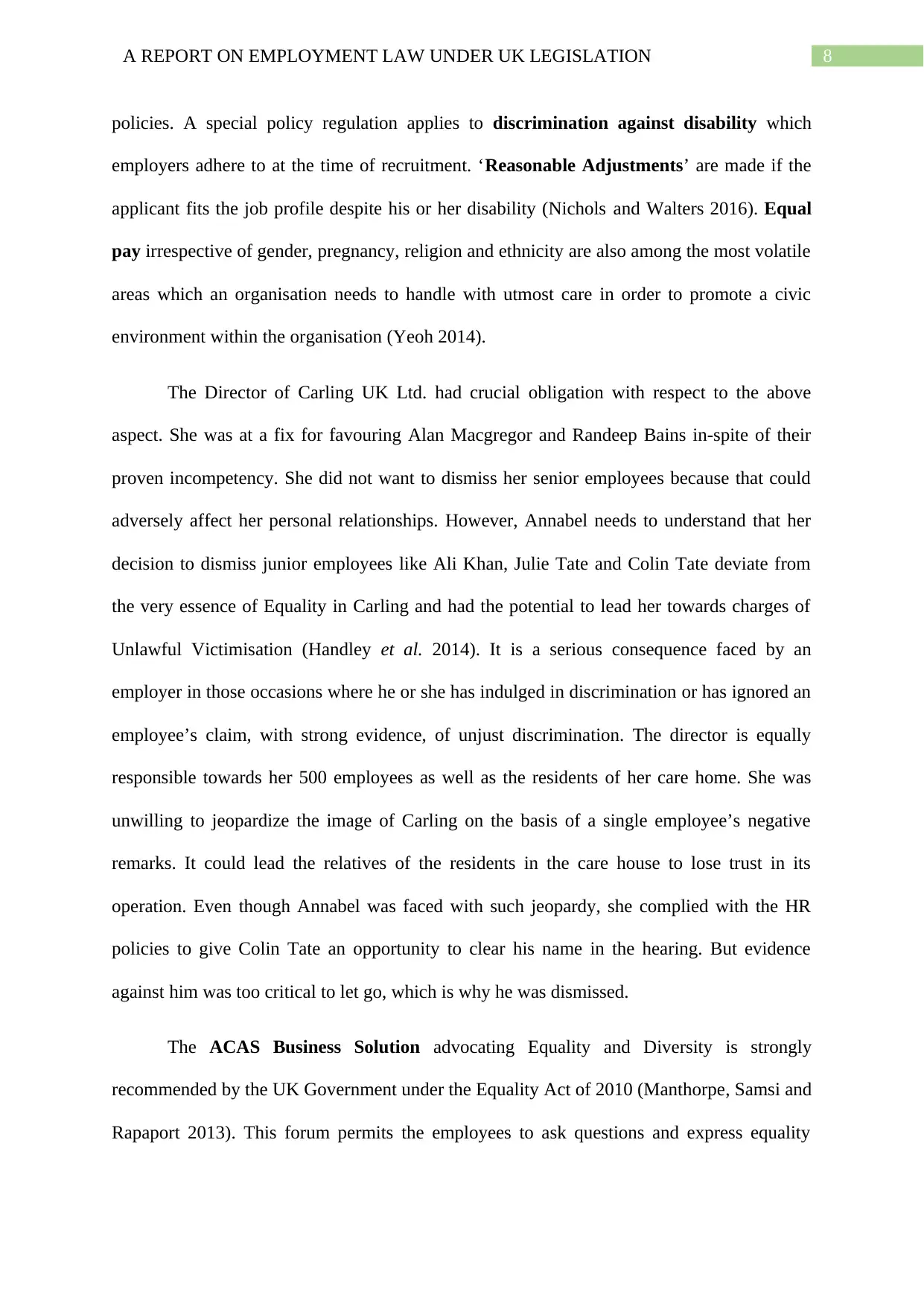
8A REPORT ON EMPLOYMENT LAW UNDER UK LEGISLATION
policies. A special policy regulation applies to discrimination against disability which
employers adhere to at the time of recruitment. ‘Reasonable Adjustments’ are made if the
applicant fits the job profile despite his or her disability (Nichols and Walters 2016). Equal
pay irrespective of gender, pregnancy, religion and ethnicity are also among the most volatile
areas which an organisation needs to handle with utmost care in order to promote a civic
environment within the organisation (Yeoh 2014).
The Director of Carling UK Ltd. had crucial obligation with respect to the above
aspect. She was at a fix for favouring Alan Macgregor and Randeep Bains in-spite of their
proven incompetency. She did not want to dismiss her senior employees because that could
adversely affect her personal relationships. However, Annabel needs to understand that her
decision to dismiss junior employees like Ali Khan, Julie Tate and Colin Tate deviate from
the very essence of Equality in Carling and had the potential to lead her towards charges of
Unlawful Victimisation (Handley et al. 2014). It is a serious consequence faced by an
employer in those occasions where he or she has indulged in discrimination or has ignored an
employee’s claim, with strong evidence, of unjust discrimination. The director is equally
responsible towards her 500 employees as well as the residents of her care home. She was
unwilling to jeopardize the image of Carling on the basis of a single employee’s negative
remarks. It could lead the relatives of the residents in the care house to lose trust in its
operation. Even though Annabel was faced with such jeopardy, she complied with the HR
policies to give Colin Tate an opportunity to clear his name in the hearing. But evidence
against him was too critical to let go, which is why he was dismissed.
The ACAS Business Solution advocating Equality and Diversity is strongly
recommended by the UK Government under the Equality Act of 2010 (Manthorpe, Samsi and
Rapaport 2013). This forum permits the employees to ask questions and express equality
policies. A special policy regulation applies to discrimination against disability which
employers adhere to at the time of recruitment. ‘Reasonable Adjustments’ are made if the
applicant fits the job profile despite his or her disability (Nichols and Walters 2016). Equal
pay irrespective of gender, pregnancy, religion and ethnicity are also among the most volatile
areas which an organisation needs to handle with utmost care in order to promote a civic
environment within the organisation (Yeoh 2014).
The Director of Carling UK Ltd. had crucial obligation with respect to the above
aspect. She was at a fix for favouring Alan Macgregor and Randeep Bains in-spite of their
proven incompetency. She did not want to dismiss her senior employees because that could
adversely affect her personal relationships. However, Annabel needs to understand that her
decision to dismiss junior employees like Ali Khan, Julie Tate and Colin Tate deviate from
the very essence of Equality in Carling and had the potential to lead her towards charges of
Unlawful Victimisation (Handley et al. 2014). It is a serious consequence faced by an
employer in those occasions where he or she has indulged in discrimination or has ignored an
employee’s claim, with strong evidence, of unjust discrimination. The director is equally
responsible towards her 500 employees as well as the residents of her care home. She was
unwilling to jeopardize the image of Carling on the basis of a single employee’s negative
remarks. It could lead the relatives of the residents in the care house to lose trust in its
operation. Even though Annabel was faced with such jeopardy, she complied with the HR
policies to give Colin Tate an opportunity to clear his name in the hearing. But evidence
against him was too critical to let go, which is why he was dismissed.
The ACAS Business Solution advocating Equality and Diversity is strongly
recommended by the UK Government under the Equality Act of 2010 (Manthorpe, Samsi and
Rapaport 2013). This forum permits the employees to ask questions and express equality
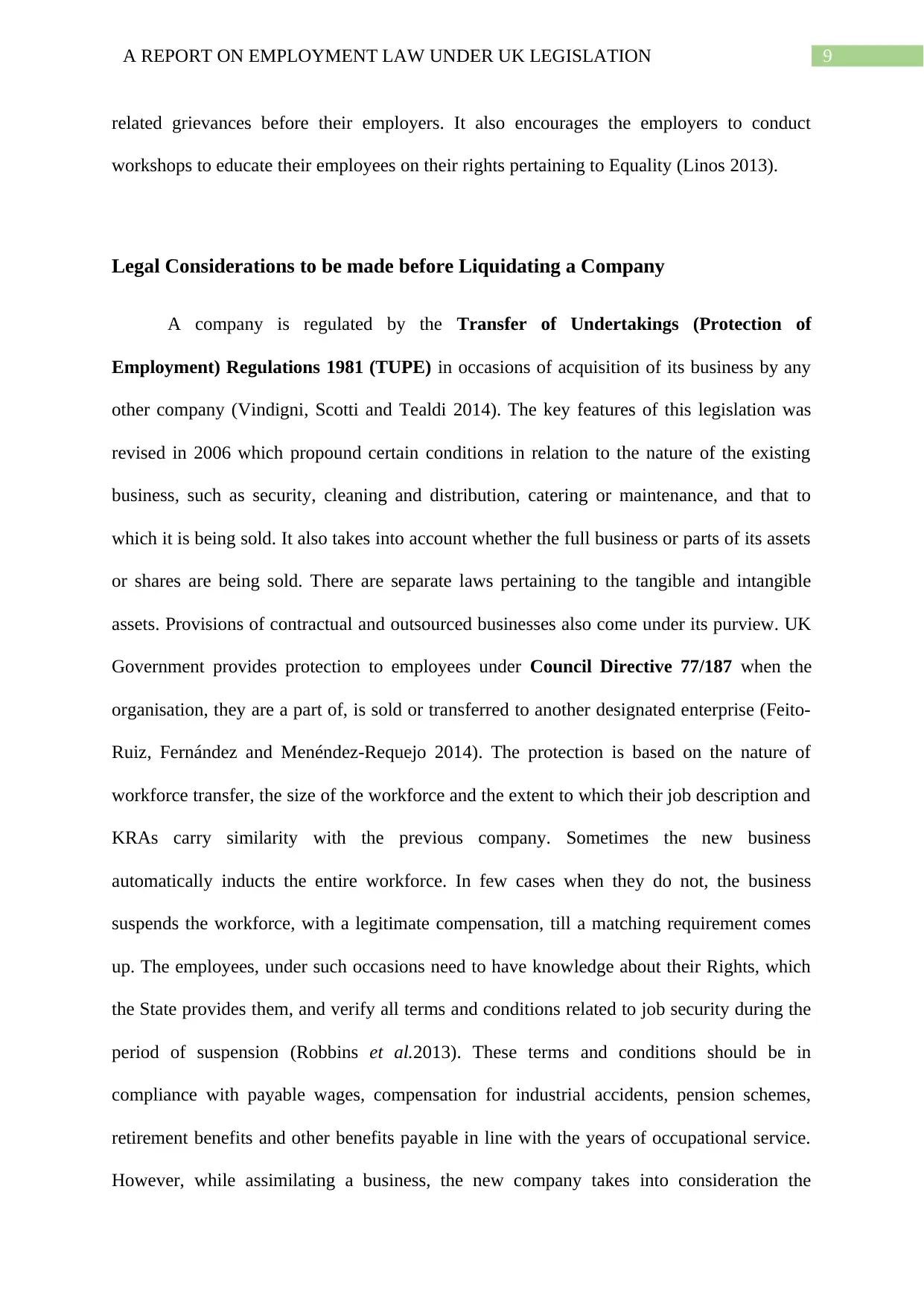
9A REPORT ON EMPLOYMENT LAW UNDER UK LEGISLATION
related grievances before their employers. It also encourages the employers to conduct
workshops to educate their employees on their rights pertaining to Equality (Linos 2013).
Legal Considerations to be made before Liquidating a Company
A company is regulated by the Transfer of Undertakings (Protection of
Employment) Regulations 1981 (TUPE) in occasions of acquisition of its business by any
other company (Vindigni, Scotti and Tealdi 2014). The key features of this legislation was
revised in 2006 which propound certain conditions in relation to the nature of the existing
business, such as security, cleaning and distribution, catering or maintenance, and that to
which it is being sold. It also takes into account whether the full business or parts of its assets
or shares are being sold. There are separate laws pertaining to the tangible and intangible
assets. Provisions of contractual and outsourced businesses also come under its purview. UK
Government provides protection to employees under Council Directive 77/187 when the
organisation, they are a part of, is sold or transferred to another designated enterprise (Feito-
Ruiz, Fernández and Menéndez-Requejo 2014). The protection is based on the nature of
workforce transfer, the size of the workforce and the extent to which their job description and
KRAs carry similarity with the previous company. Sometimes the new business
automatically inducts the entire workforce. In few cases when they do not, the business
suspends the workforce, with a legitimate compensation, till a matching requirement comes
up. The employees, under such occasions need to have knowledge about their Rights, which
the State provides them, and verify all terms and conditions related to job security during the
period of suspension (Robbins et al.2013). These terms and conditions should be in
compliance with payable wages, compensation for industrial accidents, pension schemes,
retirement benefits and other benefits payable in line with the years of occupational service.
However, while assimilating a business, the new company takes into consideration the
related grievances before their employers. It also encourages the employers to conduct
workshops to educate their employees on their rights pertaining to Equality (Linos 2013).
Legal Considerations to be made before Liquidating a Company
A company is regulated by the Transfer of Undertakings (Protection of
Employment) Regulations 1981 (TUPE) in occasions of acquisition of its business by any
other company (Vindigni, Scotti and Tealdi 2014). The key features of this legislation was
revised in 2006 which propound certain conditions in relation to the nature of the existing
business, such as security, cleaning and distribution, catering or maintenance, and that to
which it is being sold. It also takes into account whether the full business or parts of its assets
or shares are being sold. There are separate laws pertaining to the tangible and intangible
assets. Provisions of contractual and outsourced businesses also come under its purview. UK
Government provides protection to employees under Council Directive 77/187 when the
organisation, they are a part of, is sold or transferred to another designated enterprise (Feito-
Ruiz, Fernández and Menéndez-Requejo 2014). The protection is based on the nature of
workforce transfer, the size of the workforce and the extent to which their job description and
KRAs carry similarity with the previous company. Sometimes the new business
automatically inducts the entire workforce. In few cases when they do not, the business
suspends the workforce, with a legitimate compensation, till a matching requirement comes
up. The employees, under such occasions need to have knowledge about their Rights, which
the State provides them, and verify all terms and conditions related to job security during the
period of suspension (Robbins et al.2013). These terms and conditions should be in
compliance with payable wages, compensation for industrial accidents, pension schemes,
retirement benefits and other benefits payable in line with the years of occupational service.
However, while assimilating a business, the new company takes into consideration the
Secure Best Marks with AI Grader
Need help grading? Try our AI Grader for instant feedback on your assignments.
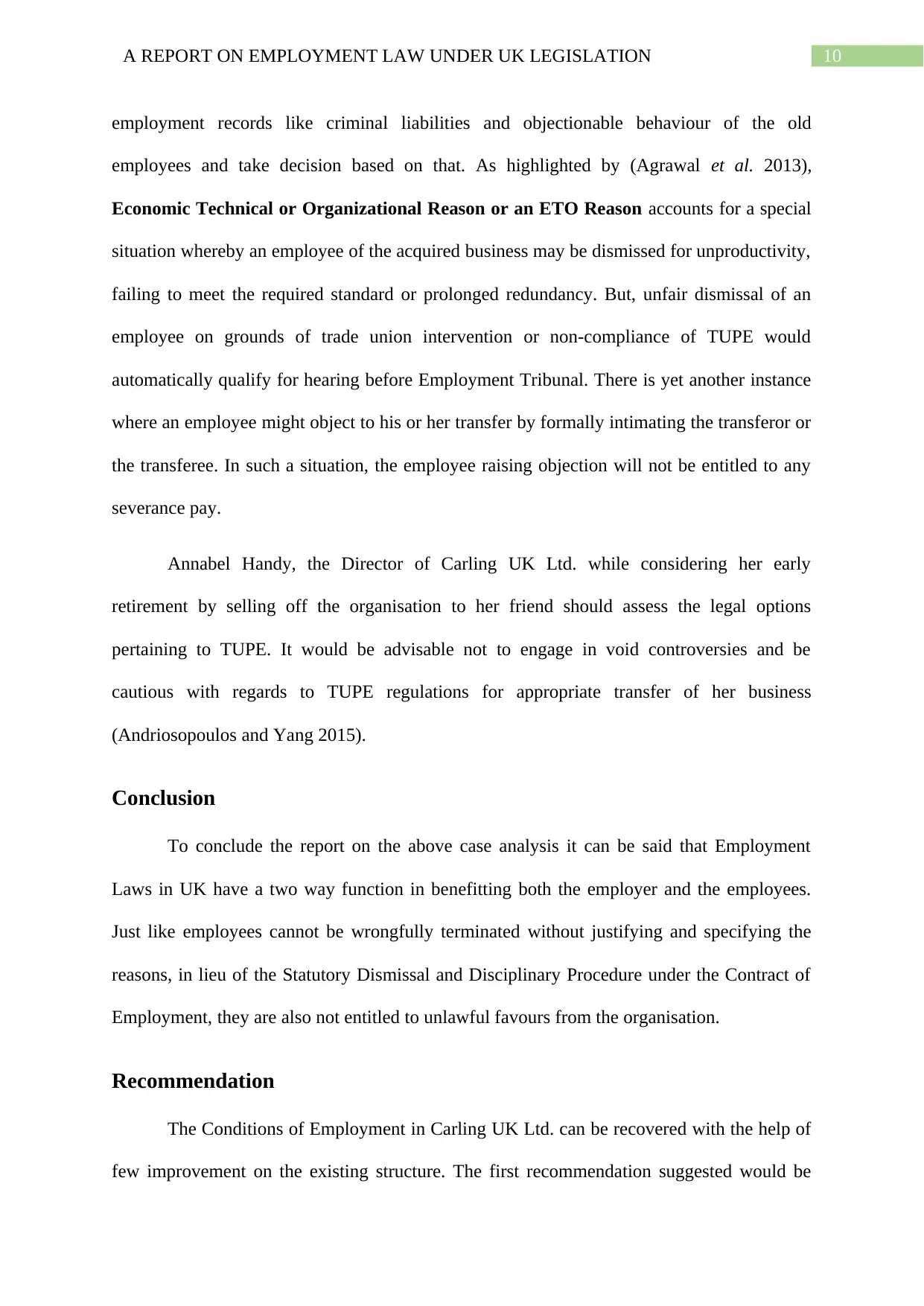
10A REPORT ON EMPLOYMENT LAW UNDER UK LEGISLATION
employment records like criminal liabilities and objectionable behaviour of the old
employees and take decision based on that. As highlighted by (Agrawal et al. 2013),
Economic Technical or Organizational Reason or an ETO Reason accounts for a special
situation whereby an employee of the acquired business may be dismissed for unproductivity,
failing to meet the required standard or prolonged redundancy. But, unfair dismissal of an
employee on grounds of trade union intervention or non-compliance of TUPE would
automatically qualify for hearing before Employment Tribunal. There is yet another instance
where an employee might object to his or her transfer by formally intimating the transferor or
the transferee. In such a situation, the employee raising objection will not be entitled to any
severance pay.
Annabel Handy, the Director of Carling UK Ltd. while considering her early
retirement by selling off the organisation to her friend should assess the legal options
pertaining to TUPE. It would be advisable not to engage in void controversies and be
cautious with regards to TUPE regulations for appropriate transfer of her business
(Andriosopoulos and Yang 2015).
Conclusion
To conclude the report on the above case analysis it can be said that Employment
Laws in UK have a two way function in benefitting both the employer and the employees.
Just like employees cannot be wrongfully terminated without justifying and specifying the
reasons, in lieu of the Statutory Dismissal and Disciplinary Procedure under the Contract of
Employment, they are also not entitled to unlawful favours from the organisation.
Recommendation
The Conditions of Employment in Carling UK Ltd. can be recovered with the help of
few improvement on the existing structure. The first recommendation suggested would be
employment records like criminal liabilities and objectionable behaviour of the old
employees and take decision based on that. As highlighted by (Agrawal et al. 2013),
Economic Technical or Organizational Reason or an ETO Reason accounts for a special
situation whereby an employee of the acquired business may be dismissed for unproductivity,
failing to meet the required standard or prolonged redundancy. But, unfair dismissal of an
employee on grounds of trade union intervention or non-compliance of TUPE would
automatically qualify for hearing before Employment Tribunal. There is yet another instance
where an employee might object to his or her transfer by formally intimating the transferor or
the transferee. In such a situation, the employee raising objection will not be entitled to any
severance pay.
Annabel Handy, the Director of Carling UK Ltd. while considering her early
retirement by selling off the organisation to her friend should assess the legal options
pertaining to TUPE. It would be advisable not to engage in void controversies and be
cautious with regards to TUPE regulations for appropriate transfer of her business
(Andriosopoulos and Yang 2015).
Conclusion
To conclude the report on the above case analysis it can be said that Employment
Laws in UK have a two way function in benefitting both the employer and the employees.
Just like employees cannot be wrongfully terminated without justifying and specifying the
reasons, in lieu of the Statutory Dismissal and Disciplinary Procedure under the Contract of
Employment, they are also not entitled to unlawful favours from the organisation.
Recommendation
The Conditions of Employment in Carling UK Ltd. can be recovered with the help of
few improvement on the existing structure. The first recommendation suggested would be
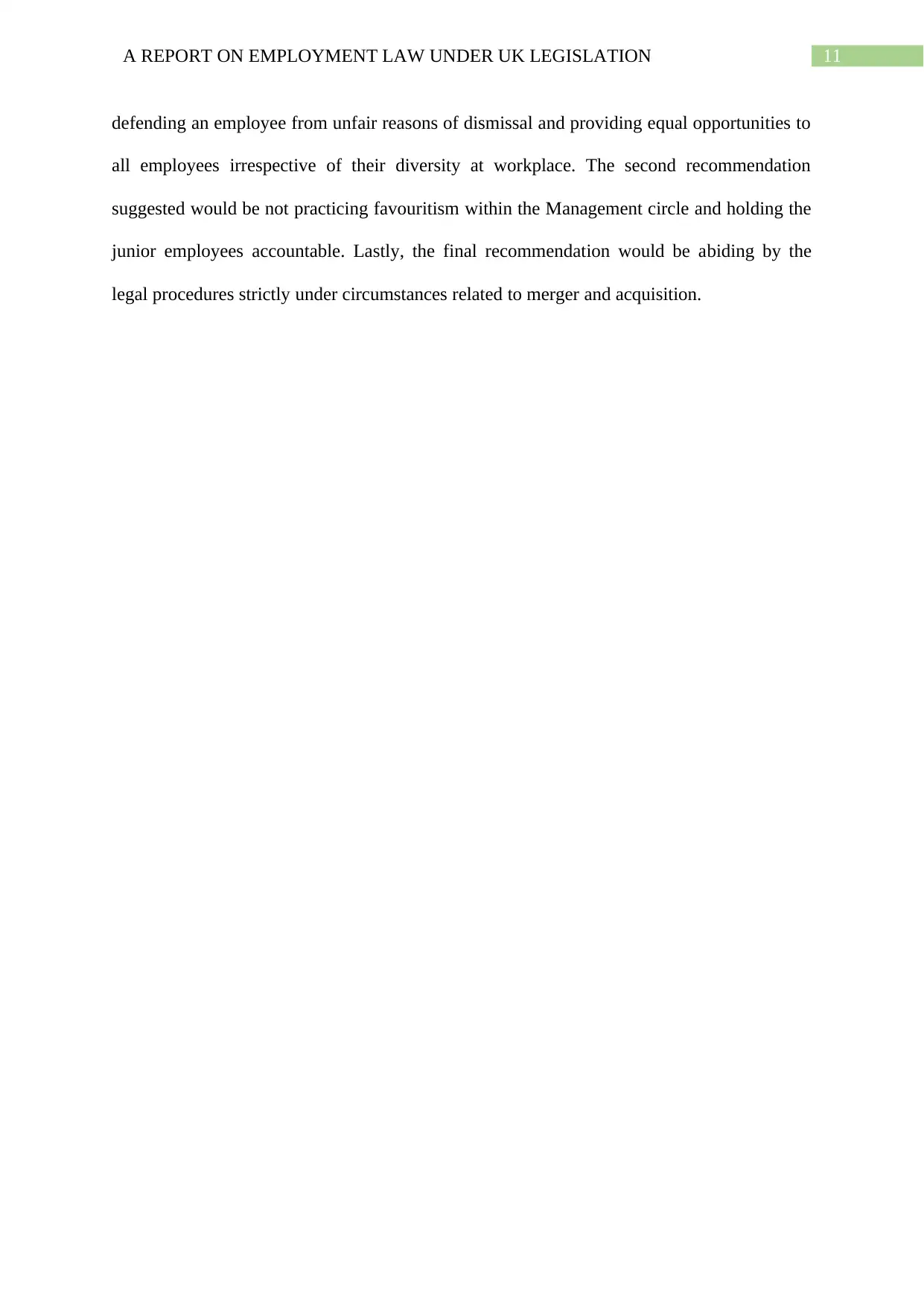
11A REPORT ON EMPLOYMENT LAW UNDER UK LEGISLATION
defending an employee from unfair reasons of dismissal and providing equal opportunities to
all employees irrespective of their diversity at workplace. The second recommendation
suggested would be not practicing favouritism within the Management circle and holding the
junior employees accountable. Lastly, the final recommendation would be abiding by the
legal procedures strictly under circumstances related to merger and acquisition.
defending an employee from unfair reasons of dismissal and providing equal opportunities to
all employees irrespective of their diversity at workplace. The second recommendation
suggested would be not practicing favouritism within the Management circle and holding the
junior employees accountable. Lastly, the final recommendation would be abiding by the
legal procedures strictly under circumstances related to merger and acquisition.
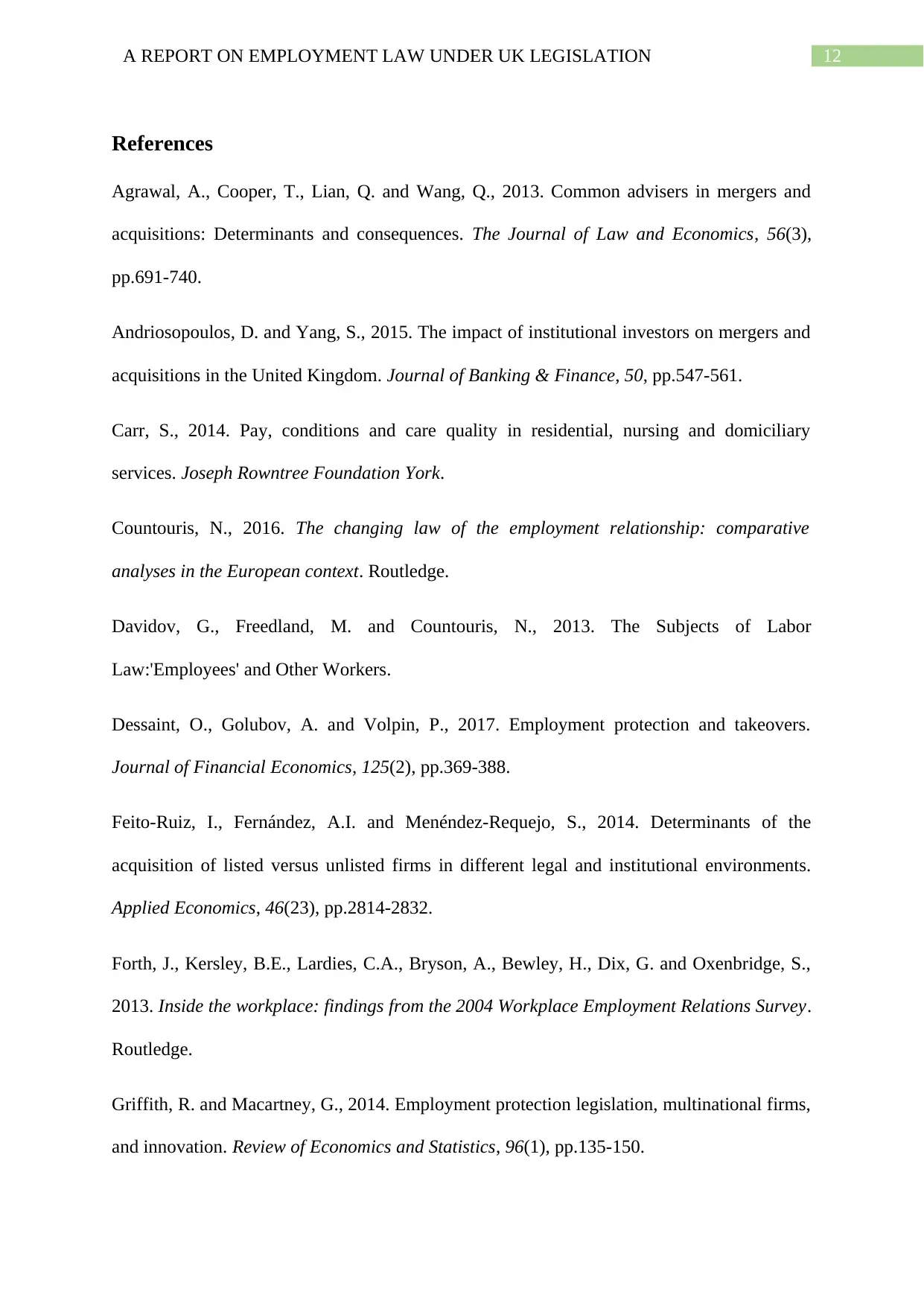
12A REPORT ON EMPLOYMENT LAW UNDER UK LEGISLATION
References
Agrawal, A., Cooper, T., Lian, Q. and Wang, Q., 2013. Common advisers in mergers and
acquisitions: Determinants and consequences. The Journal of Law and Economics, 56(3),
pp.691-740.
Andriosopoulos, D. and Yang, S., 2015. The impact of institutional investors on mergers and
acquisitions in the United Kingdom. Journal of Banking & Finance, 50, pp.547-561.
Carr, S., 2014. Pay, conditions and care quality in residential, nursing and domiciliary
services. Joseph Rowntree Foundation York.
Countouris, N., 2016. The changing law of the employment relationship: comparative
analyses in the European context. Routledge.
Davidov, G., Freedland, M. and Countouris, N., 2013. The Subjects of Labor
Law:'Employees' and Other Workers.
Dessaint, O., Golubov, A. and Volpin, P., 2017. Employment protection and takeovers.
Journal of Financial Economics, 125(2), pp.369-388.
Feito-Ruiz, I., Fernández, A.I. and Menéndez-Requejo, S., 2014. Determinants of the
acquisition of listed versus unlisted firms in different legal and institutional environments.
Applied Economics, 46(23), pp.2814-2832.
Forth, J., Kersley, B.E., Lardies, C.A., Bryson, A., Bewley, H., Dix, G. and Oxenbridge, S.,
2013. Inside the workplace: findings from the 2004 Workplace Employment Relations Survey.
Routledge.
Griffith, R. and Macartney, G., 2014. Employment protection legislation, multinational firms,
and innovation. Review of Economics and Statistics, 96(1), pp.135-150.
References
Agrawal, A., Cooper, T., Lian, Q. and Wang, Q., 2013. Common advisers in mergers and
acquisitions: Determinants and consequences. The Journal of Law and Economics, 56(3),
pp.691-740.
Andriosopoulos, D. and Yang, S., 2015. The impact of institutional investors on mergers and
acquisitions in the United Kingdom. Journal of Banking & Finance, 50, pp.547-561.
Carr, S., 2014. Pay, conditions and care quality in residential, nursing and domiciliary
services. Joseph Rowntree Foundation York.
Countouris, N., 2016. The changing law of the employment relationship: comparative
analyses in the European context. Routledge.
Davidov, G., Freedland, M. and Countouris, N., 2013. The Subjects of Labor
Law:'Employees' and Other Workers.
Dessaint, O., Golubov, A. and Volpin, P., 2017. Employment protection and takeovers.
Journal of Financial Economics, 125(2), pp.369-388.
Feito-Ruiz, I., Fernández, A.I. and Menéndez-Requejo, S., 2014. Determinants of the
acquisition of listed versus unlisted firms in different legal and institutional environments.
Applied Economics, 46(23), pp.2814-2832.
Forth, J., Kersley, B.E., Lardies, C.A., Bryson, A., Bewley, H., Dix, G. and Oxenbridge, S.,
2013. Inside the workplace: findings from the 2004 Workplace Employment Relations Survey.
Routledge.
Griffith, R. and Macartney, G., 2014. Employment protection legislation, multinational firms,
and innovation. Review of Economics and Statistics, 96(1), pp.135-150.
Paraphrase This Document
Need a fresh take? Get an instant paraphrase of this document with our AI Paraphraser
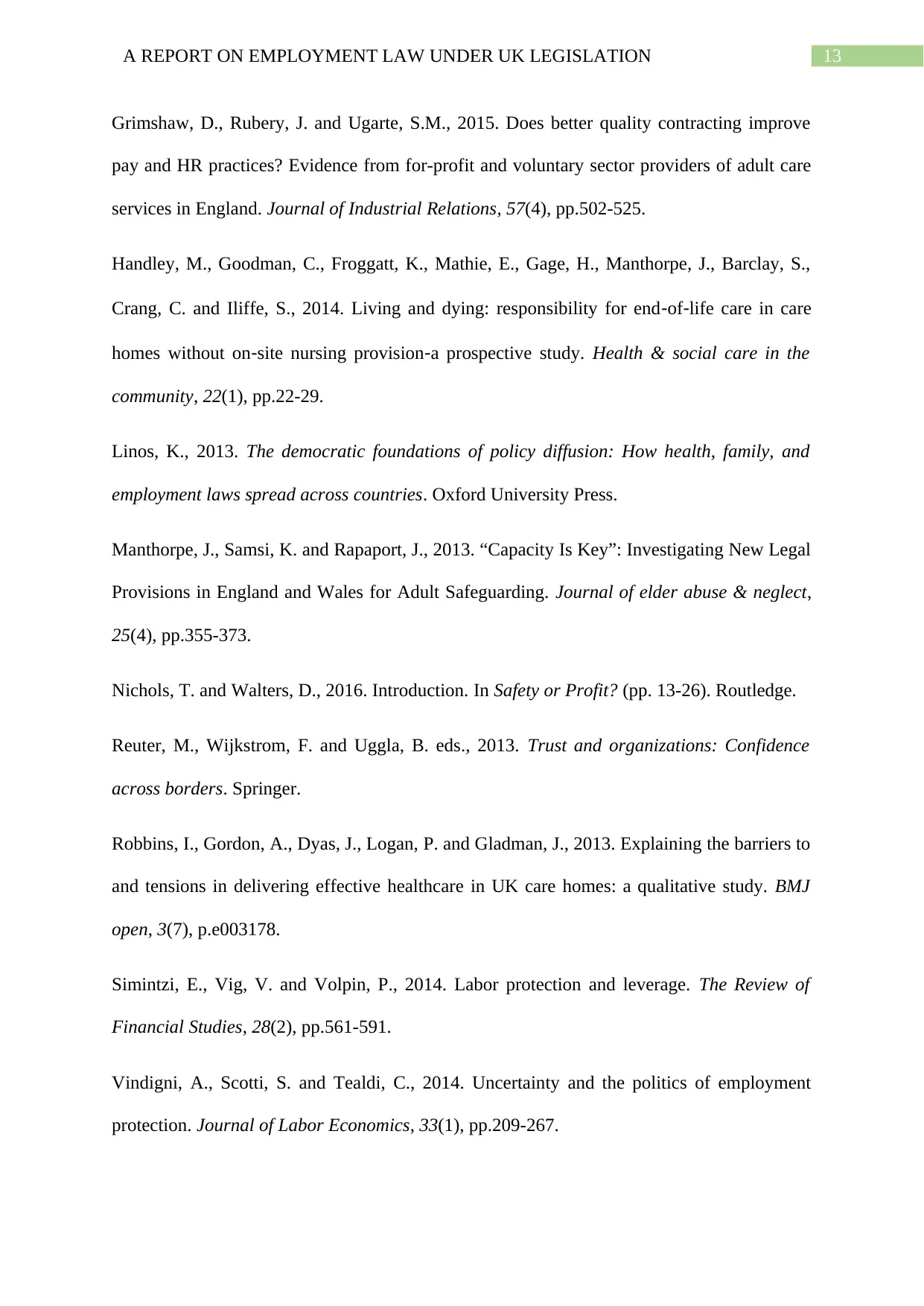
13A REPORT ON EMPLOYMENT LAW UNDER UK LEGISLATION
Grimshaw, D., Rubery, J. and Ugarte, S.M., 2015. Does better quality contracting improve
pay and HR practices? Evidence from for-profit and voluntary sector providers of adult care
services in England. Journal of Industrial Relations, 57(4), pp.502-525.
Handley, M., Goodman, C., Froggatt, K., Mathie, E., Gage, H., Manthorpe, J., Barclay, S.,
Crang, C. and Iliffe, S., 2014. Living and dying: responsibility for end‐of‐life care in care
homes without on‐site nursing provision‐a prospective study. Health & social care in the
community, 22(1), pp.22-29.
Linos, K., 2013. The democratic foundations of policy diffusion: How health, family, and
employment laws spread across countries. Oxford University Press.
Manthorpe, J., Samsi, K. and Rapaport, J., 2013. “Capacity Is Key”: Investigating New Legal
Provisions in England and Wales for Adult Safeguarding. Journal of elder abuse & neglect,
25(4), pp.355-373.
Nichols, T. and Walters, D., 2016. Introduction. In Safety or Profit? (pp. 13-26). Routledge.
Reuter, M., Wijkstrom, F. and Uggla, B. eds., 2013. Trust and organizations: Confidence
across borders. Springer.
Robbins, I., Gordon, A., Dyas, J., Logan, P. and Gladman, J., 2013. Explaining the barriers to
and tensions in delivering effective healthcare in UK care homes: a qualitative study. BMJ
open, 3(7), p.e003178.
Simintzi, E., Vig, V. and Volpin, P., 2014. Labor protection and leverage. The Review of
Financial Studies, 28(2), pp.561-591.
Vindigni, A., Scotti, S. and Tealdi, C., 2014. Uncertainty and the politics of employment
protection. Journal of Labor Economics, 33(1), pp.209-267.
Grimshaw, D., Rubery, J. and Ugarte, S.M., 2015. Does better quality contracting improve
pay and HR practices? Evidence from for-profit and voluntary sector providers of adult care
services in England. Journal of Industrial Relations, 57(4), pp.502-525.
Handley, M., Goodman, C., Froggatt, K., Mathie, E., Gage, H., Manthorpe, J., Barclay, S.,
Crang, C. and Iliffe, S., 2014. Living and dying: responsibility for end‐of‐life care in care
homes without on‐site nursing provision‐a prospective study. Health & social care in the
community, 22(1), pp.22-29.
Linos, K., 2013. The democratic foundations of policy diffusion: How health, family, and
employment laws spread across countries. Oxford University Press.
Manthorpe, J., Samsi, K. and Rapaport, J., 2013. “Capacity Is Key”: Investigating New Legal
Provisions in England and Wales for Adult Safeguarding. Journal of elder abuse & neglect,
25(4), pp.355-373.
Nichols, T. and Walters, D., 2016. Introduction. In Safety or Profit? (pp. 13-26). Routledge.
Reuter, M., Wijkstrom, F. and Uggla, B. eds., 2013. Trust and organizations: Confidence
across borders. Springer.
Robbins, I., Gordon, A., Dyas, J., Logan, P. and Gladman, J., 2013. Explaining the barriers to
and tensions in delivering effective healthcare in UK care homes: a qualitative study. BMJ
open, 3(7), p.e003178.
Simintzi, E., Vig, V. and Volpin, P., 2014. Labor protection and leverage. The Review of
Financial Studies, 28(2), pp.561-591.
Vindigni, A., Scotti, S. and Tealdi, C., 2014. Uncertainty and the politics of employment
protection. Journal of Labor Economics, 33(1), pp.209-267.
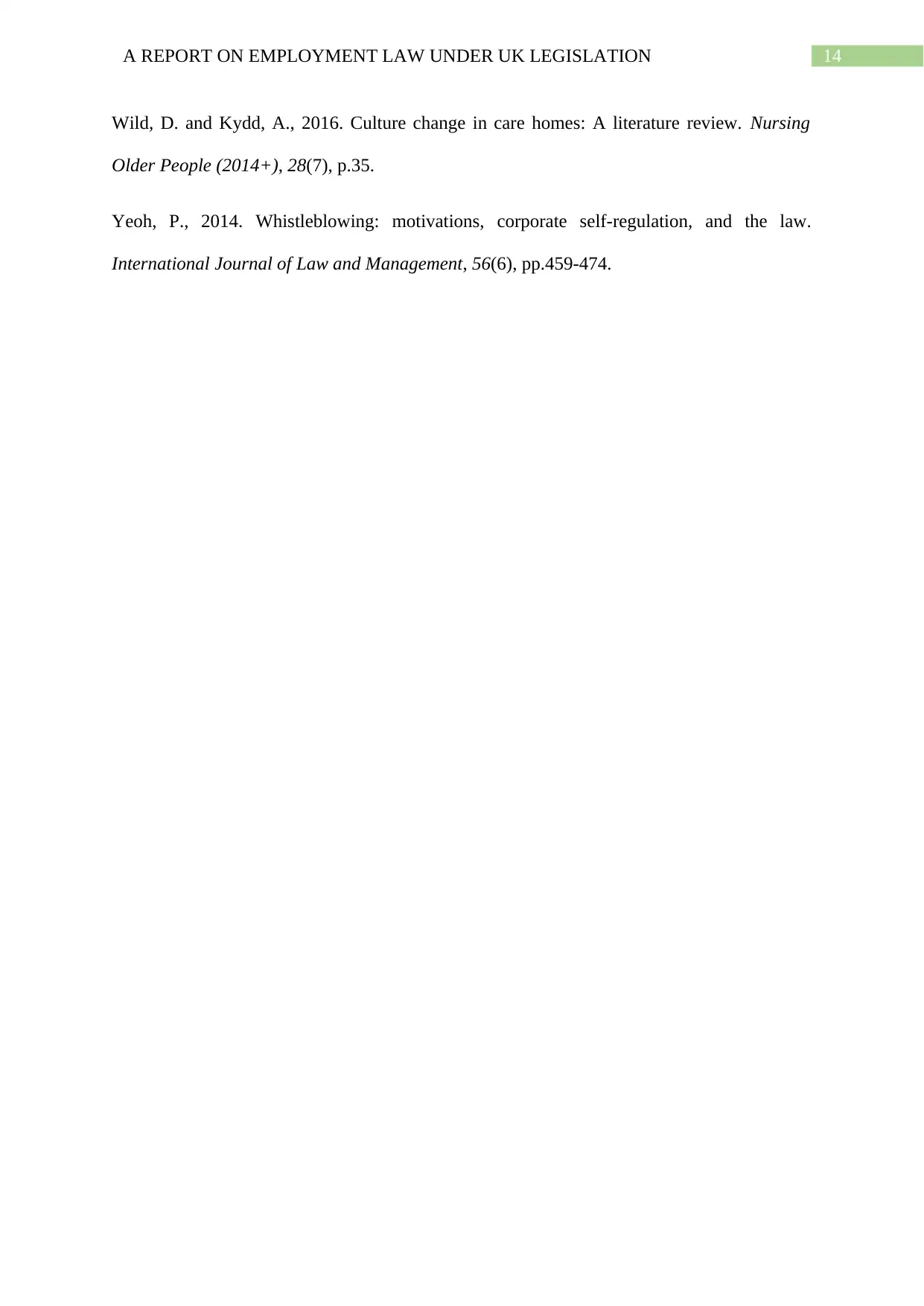
14A REPORT ON EMPLOYMENT LAW UNDER UK LEGISLATION
Wild, D. and Kydd, A., 2016. Culture change in care homes: A literature review. Nursing
Older People (2014+), 28(7), p.35.
Yeoh, P., 2014. Whistleblowing: motivations, corporate self-regulation, and the law.
International Journal of Law and Management, 56(6), pp.459-474.
Wild, D. and Kydd, A., 2016. Culture change in care homes: A literature review. Nursing
Older People (2014+), 28(7), p.35.
Yeoh, P., 2014. Whistleblowing: motivations, corporate self-regulation, and the law.
International Journal of Law and Management, 56(6), pp.459-474.
1 out of 15
Related Documents
Your All-in-One AI-Powered Toolkit for Academic Success.
+13062052269
info@desklib.com
Available 24*7 on WhatsApp / Email
![[object Object]](/_next/static/media/star-bottom.7253800d.svg)
Unlock your academic potential
© 2024 | Zucol Services PVT LTD | All rights reserved.



